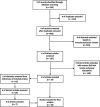Effectiveness of medical ethics education: a systematic review
- PMID: 38486576
- PMCID: PMC10939587
- DOI: 10.15694/mep.2021.000175.1
Effectiveness of medical ethics education: a systematic review
Abstract
This article was migrated. The article was marked as recommended. Background Medical ethics is universally accepted as a fundamental part of medical education. One of the current challenges lies in assessing its effectiveness. The primary objective is to analyze the impact of training in medical ethics, and secondly to describe educational practices and discuss the most effective and appropriate pedagogical models. Methods The PubMed and EMBASE databases were searched for studies up June 2019. Studies with a focus on assessing teaching medical ethics were considered. The included population were medical students, residents or faculty physicians with quantitative measured outcomes with at least one of the following criteria: i) pre and post intervention evaluation or ii) a comparison with a control group that did not receive the educational intervention. Results A total of 26 studies ranging from 1990 to 2017 were included: 12 (46%) with medical students, 12 (46%) with residents and 2 (8%) with faculty physicians. The most common outcomes are Knowledge, Confidence and Attitudes/ Behaviour. Assessment instruments are knowledge tests, self-assessment questionnaires, reviewing clinical charts and OSCE. Positive statistically significant differences were found in outcomes in 19 (73%) studies. Conclusions A great heterogeneity was found in the way of teaching, assessment and measured outcomes. Most studies focus in medical students or residents. Very few studies present follow-up measures, simulation training and validated and standardized assessment tools with behavioural components. Therefore, the evidence to support the positive impact remains weak. Future research on medical ethical training ought to place similar effort and rigour as other clinical competence skills.
Keywords: Effectiveness; Ethical training; Ethics competence; Impact.; Medical education; Medical ethics; Medical practice.
Copyright: © 2021 Moreira F et al.
Similar articles
-
The effectiveness of internet-based e-learning on clinician behavior and patient outcomes: a systematic review protocol.JBI Database System Rev Implement Rep. 2015 Jan;13(1):52-64. doi: 10.11124/jbisrir-2015-1919. JBI Database System Rev Implement Rep. 2015. PMID: 26447007
-
Behavioural modification interventions for medically unexplained symptoms in primary care: systematic reviews and economic evaluation.Health Technol Assess. 2020 Sep;24(46):1-490. doi: 10.3310/hta24460. Health Technol Assess. 2020. PMID: 32975190 Free PMC article.
-
The future of Cochrane Neonatal.Early Hum Dev. 2020 Nov;150:105191. doi: 10.1016/j.earlhumdev.2020.105191. Epub 2020 Sep 12. Early Hum Dev. 2020. PMID: 33036834
-
Effective teaching of communication to health professional undergraduate and postgraduate students: A Systematic Review.JBI Libr Syst Rev. 2012;10(28 Suppl):1-12. doi: 10.11124/jbisrir-2012-327. JBI Libr Syst Rev. 2012. PMID: 27820404
-
Effectiveness of high fidelity simulation versus low fidelity simulation on practical/clinical skill development in pre-registration physiotherapy students: a systematic review.JBI Database System Rev Implement Rep. 2019 Jun;17(6):1229-1255. doi: 10.11124/JBISRIR-2017-003931. JBI Database System Rev Implement Rep. 2019. PMID: 30964770
Cited by
-
Moral competence of dental students: an explanatory mixed-methods study.BMC Med Educ. 2025 Jan 24;25(1):118. doi: 10.1186/s12909-025-06636-7. BMC Med Educ. 2025. PMID: 39856667 Free PMC article.
References
Publication types
LinkOut - more resources
Full Text Sources


